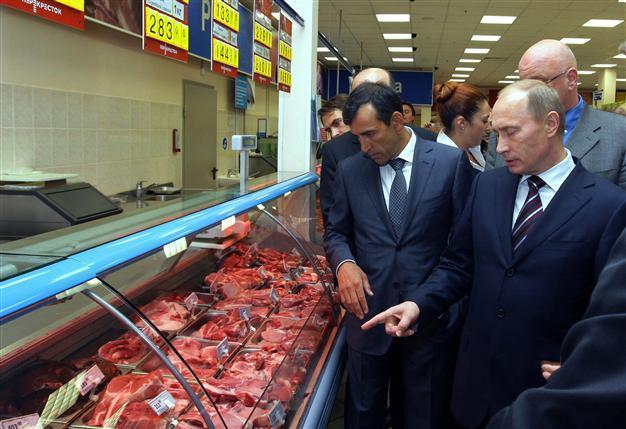Russia to ban US meat imports February 11
MOSCOW - Agence France-Presse

A file picture taken on June 24, 2009 shows Vladimir Putin (C), then Russia's Prime Minister, pointing at meat on display at a Perekrestok supermarket during his visit to the shop in Moscow.AFP Photo
Russia said Wednesday it would stop importing all US meat and pork products on February 11 over concerns about the use of a feed additive that is also banned in China and Europe.
The decision comes amidst a broader chill in Russian-US relations linked to Washington's retaliation against alleged rights abuses by Moscow officials.
A US trade association said the ban could affect about $500 million (370 million euros) in annual sales.
Russia's announcement follows the Rosselkhoznadzor veterinary and phytosanitary surveillance service's earlier decision to ban the import of chilled meat and pork from the United States as of February 4.
The entire episode relates to a drug called ractopamine that is added to feed in the United States and other countries such as Canada to promote the development of lean meat.
The additive -- considered safe in North America -- has been prohibited by both the European Union and Russia as well as China.
All US meat exported to these countries is certified to be ractopamine free.
But Rosselkhoznadzor head Sergei Dankvert told Interfax that traces of the drug were still being discovered in meat coming from the United States and that Russia intended to stop all imports as a result.
"Since the violations are continuing and we are detecting ractopamine in meat being supplied by the United States, we intend to introduce limits on the import of these products as of February 11," Dankvert said.
The food safety enforcement agency said the US Department of Agriculture had been formally notified of Russia's displeasure with its export violations.
Rosselkhoznadzor pointed to a specific US pork production plant -- identified only as No. 17D -- and a beef liver cannery named No. 235 as the guilty parties.
Its brief statement said the plants had committed "grave violations" of Russia's veterinary and sanitation law.
Russia has imported vast quantities of beef and poultry from the United States since the Soviet era and relied on foreign imports to feed its population for much of the 1990s.
But Moscow has also been known to use trade wars as a diplomatic weapon and enraged the European Union in 2011 when it banned its vegetables for several months over an E. coli outbreak.
Signs that Russia intended to target US meat emerged several weeks ago as Moscow and Washington got embroiled in a diplomatic tussle that eventually resulted in a ban on US adoptions of Russian children.
Moscow first indicated that it would start small by only banning chilled meat products, not the broader category of frozen meat covered in the February 11 measure.
The US Meat Export Federation said "only a very small portion of US meat exported to Russia was in chilled form" and that most of its meat would fall under the second ban that comes into effect February 11.
The US trade association estimated annual US meat and pork exports to Russia at about $500 million (370 million euros).
Rosselkhoznadzor had initially warned Canada that its meat and pork products would also be stopped at the border unless it took extra measures to address Moscow's ractopamine concerns.
The Interfax news agency reported that the Canadian Food Inspection Agency had assured the Russians that it would be stepping up its ractopamine surveillance and had therefore escaped the ban.
